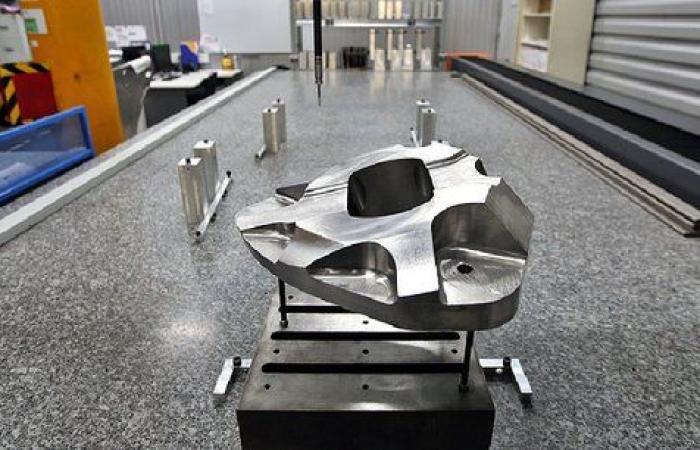A month of strike at Boeing and negotiations are still deadlocked. Faced with the large-scale social movement which paralyzes the production of best-seller, the 737 MAX, the American aircraft manufacturer is preparing for heavy losses – a negative operating margin of 54% in the third quarter for the commercial aircraft division. In this context, the manufacturer announced the elimination of around 10% of its global workforce, or 17,000 positions.
The repercussions of this crisis will not stop at the gates of Boeing or even at the American border. Largely involved in the American aircraft manufacturer’s programs, the French aeronautics sector will have difficulty escaping the wave, even though it has already been suffering from repeated difficulties from Boeing for many months.
This strike could therefore be a real blow to Safran. According to information collected by The TribuneBoeing has decided to stop taking delivery of Leap-1B engines, produced by the French engine manufacturer and its American partner GE Aviation via their joint venture CFM International.
Information on which Safran did not wish to comment, while Boeing says it is still taking deliveries from Leap at the moment. It remains to be seen for how long. The American manufacturer also specifies that it has not given any general instructions to the supply chainwith decisions on a case-by-case basis for each company and each product.
Safran’s results soar despite its difficulties in delivering its engines
The cessation of deliveries could have multiple impacts for the group led by Olivier Andriès. Safran and GE will thus find themselves deprived of payments from Boeing, the bulk of an engine being paid for on delivery. Especially since Leap deliveries (all models combined) had already fallen by 15% in the first half of the year compared to the same period in 2023 and the two partners had already had to lower their annual forecasts during the half-year results: an increase in production of between 0 and 5%, compared to 10 to 15% initially planned.
Another problem, the two engine manufacturers will find themselves with an expensive stock of engines on their hands. Here too, Safran had already recorded a negative impact on its balance sheet, with a variation in its working capital requirement of -140 million euros largely due to lower than expected deliveries from Leap.
Slowdown for parts manufacturers
The engine manufacturer has not stopped its supplies, in order to limit the impact on its own subcontractors, but the pace should be revised downwards, with consequences on the activity of manufacturers of metal parts. This is the case, for example, for the Lot-based Figeac Aero group supplying parts for the Leap-1B engines equipping the Boeing 737MAX (around 40,000 euros value per plane).
« The drop in Boeing production has generated an additional adjustment in engine requirements and Safran is passing on its parts requirements to us. For us, this represents a slowdown in activity of around 20%,” testifies to La Tribune Jean-Claude Maillard, CEO of Figeac Aero.
Even if the second largest manufacturer in the world represents only 15% of Figeac Aéro’s activity, the group had already anticipated a loss of four million euros for its financial year in the spring, due to multiple quality problems on the Boeing 737MAX since the start of the year. Safran has also already decided to slow down the pace even before this strike, while Boeing found itself limited in its ramp-up by the American Federal Aviation Administration (FAA) due to the recurring problems experienced by the American aircraft manufacturer.
Avoid new quality problems
Beyond the issue of engines, the social movement has repercussions on French manufacturers of aerostructures and equipment, like the Toulouse group Latécoère. Boeing represents only 15% of turnover and the majority of contracts relate to the 787, the long-haul aircraft spared by the strike. However, the social movement affects the production of the 777 cargo door at its Gers site in Gimont and the wiring of the 737 MAX in the Hermosillo factory in Mexico.
Bad news. And for good reason, Latécoère was counting on the announced significant increase in production rates for the 737MAX to reduce its dependence on Airbus programs and find new growth drivers. The century-old group has not yet returned to its pre-Covid level and its debt stood at 125 million euros at the end of last year.
An internal source nevertheless underlines “ the goodwill of Boeing to cushion the effects of this strike and find solutions “. Negotiations are intense with subcontractors. Objective: to avoid a sudden stop in manufacturing, as during the health crisis, which would make it very difficult to resume activity in a supply chain, already weakened by a lack of cash. With the risk also of creating new quality problems on the final aircraft.
Aeronautics: Latécoère impacted by supply chain and Boeing difficulties
La solution Airbus ?
The French industry hopes to partly offset this slack from Boeing with strong demand from its European rival. « Airbus is experiencing very strong momentum, which helps offset a large part of Boeing’s decline. Despite these headwinds, we are maintaining our financial objectives for this year », points out the CEO of Figeac Aero which has just won 65 million euros in new contracts on the A320.
While waiting for the end of the strike, to the great dismay of the industry and Airbus, it is not easy to transfer resources to the Leap-1A program which equips the European manufacturer’s A320 NEO. As Olivier Andriès explained to The Tribune last June: “There are very few common parts between the Leap-1A engine (which powers the Airbus A320neo, Editor’s note) and the Leap-1B (of Boeing’s 737 MAX, Editor’s note). And it’s not on the assembly line that this happens. Once we receive the parts in our factory, we release an engine in less than fifteen days. This happens upstream. » Additionally, part of Safran’s load for the Leap-1B is in Mexico, with final assembly carried out by GE in the United States.
Aeronautics: Figeac Aéro boosted by new contracts for the A320
Quick consequences
French subcontractors will in any case have to find solutions quickly. Their financial situation, already complicated, can deteriorate very quickly, as explained by Louis Catala, vice-president at the consulting firm Efeso and formerly of Daher. He particularly warns against the effect bullwhip (or whiplash), where variations in the pace of the ordering party – in this case Boeing – have repercussions on all levels of the supply chain, affecting its visibility and potentially untimely decisions.
If stock begins to accumulate with certain subcontractors, the effects on cash flow could very quickly be felt. And this could even prove harmful for companies whose balance sheet is already fragile or whose activity is not diversified enough.






